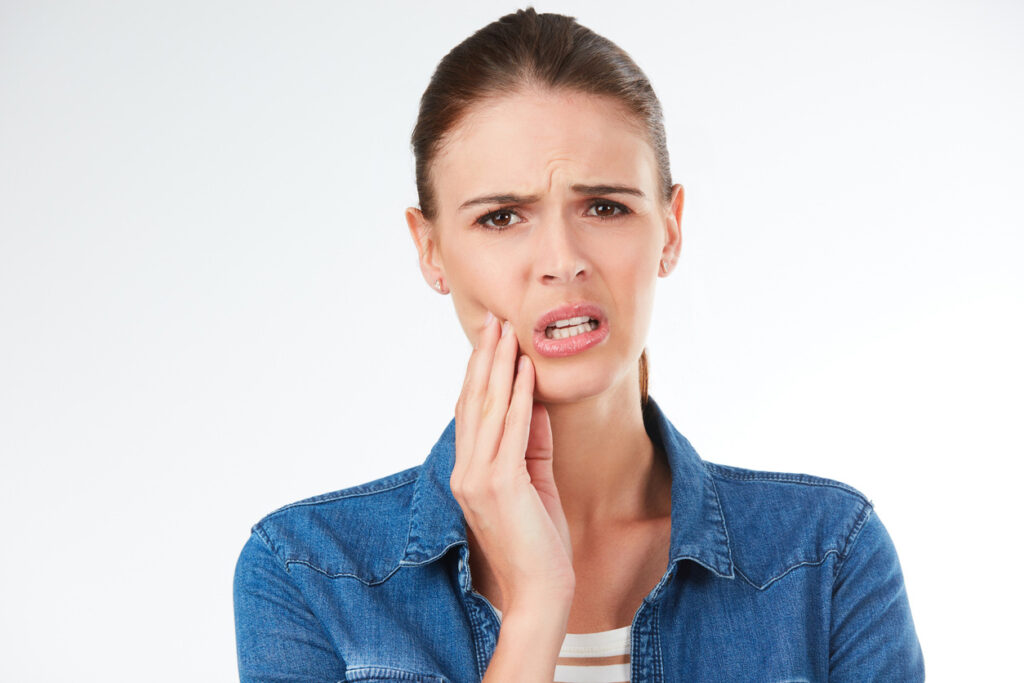Temporomandibular Joint Pain
Temporomandibular joint (TMJ) pain can be debilitating and range from episodic (occurring from time to time at irregular intervals) to chronic (occurring consistently for more than three months) and is often associated with Temporomandibular Joint Disorder (TMJD). TMJD’s wide range of symptoms are often described as pain or tenderness at the jaw joints, tooth pain, headaches, neck pain, ear pain or stuffy ears, toothaches, gum pain, facial pain or muscle twitching. Often, physicians misdiagnose these symptoms as something else and unfortunately, provide ineffective treatments that never address the root cause of the problem.

TMJ Disorder
TMJ Disorder affects the jaw joints (the joints connecting the lower jaw to the skull) and is a commonly misunderstood and misdiagnosed disorder affecting millions. It often leads to inflammation that reduces blood flow and results in pain elsewhere in the body, specifically the head and neck. However, thanks to Dr. Priya Mistry of the TMJ Doc, you can explore the hidden cause behind TMJ disorder and how these small joints cause such significant pain.
What causes inflammation in the body?
Inflammation is a normal response that the body’s immune system invokes to an irritant like an injury, infection, or foreign object. When the body senses an irritant, the brain signals the immune system to fight the problem as cells release histamine, bradykinin, and prostaglandins into the targeted tissue. These bodily chemicals cause the blood vessels to release a fluid that may lead to swelling or inflammation. As a result, you may discover an injured or painful area swell, turn red, or feel warm to the touch. Additionally, the hormones released to the targeted area can irritate the nerves and send pain signals to the brain.
How muscle inflammation relates to TMJ Disorder
If you have been diagnosed with TMJ Disorder or suspect that you may suffer from this condition, you may wonder how your jaw joints could cause stuffy ears, headaches, neck pain, toothaches, or facial muscle twitches. The cause of these related symptoms is connected to the source of the pain – muscle inflammation.
When TMJ Disorder develops, the body’s natural response is to invoke an inflammatory response in an attempt to heal the problem area. When this occurs, inflammation affects the surrounding tissue, including the jaw and facial muscles as well as the surrounding nerves. This can be problematic for a TMJD sufferer because the face and head have an intricate webbing of nerves that connect to the spinal column. Therefore, swelling of the jaw joints adds pressure to surrounding nerves and reduces blood flow, sending pain signals to the brain. Additionally, jaw joint swelling can make the ears sound stuffy or cause tinnitus (ringing in the ears), as well as toothaches or gum pain, and referred pain to the head (in the form of headaches or migraines) or neck.
How to reduce jaw joint inflammation
If you have jaw joint inflammation related to TMJ Disorder, you should seek the care of a TMJ specialist like Dr. Mistry of the TMJ Doc. After a thorough examination to determine the precise cause of your TMJD, Dr. Mistry focuses on reducing jaw joint inflammation and increasing blood flow to the targeted area to promote the first phase of healing. Dr. Mistry may achieve this by providing a variety of treatment modalities such as prescribing a custom oral orthotic that repositions the jaw to a comfortable position, relieving pressure from jaw joint misalignment. Additionally, Dr. Mistry offers therapeutic treatments like craniofacial therapy, myofascial release, and jaw manipulation for TMJ pain.
Dr. Mistry takes a holistic approach to treating TMJ disorder, which means she doesn’t just treat the jaw joints but focuses on treatments that help to improve your overall health. For instance, you may also benefit from improving your diet by incorporating for fresh fruits and vegetables (foods that reduce inflammation) and eliminating or reducing processed foods and sugar, which are known to increase the body’s inflammatory response. Other lifestyle factors such as tobacco usage and alcohol consumption increase inflammation throughout the body. Therefore, Dr. Mistry may recommend reducing your usage or consumption of these substances or quitting them entirely to help your body heal and promote better overall health.
Temporomandibular Joint Dysfunction Dentist in Vancouver, WA and Portland, OR
TMJ pain is not something you have to deal with for the rest of your life. There are TMJD treatments available to help get you out of pain so that you can get on with your life. To learn more about TMJ Disorder or find out if you have this disorder, contact the TMJ Doc by calling (503) 255-8293.
